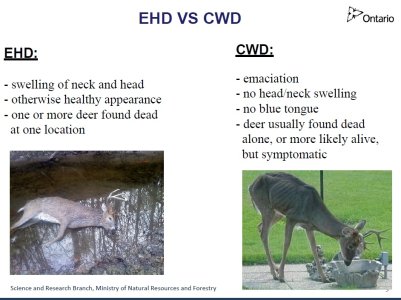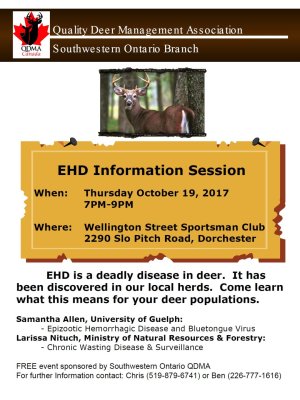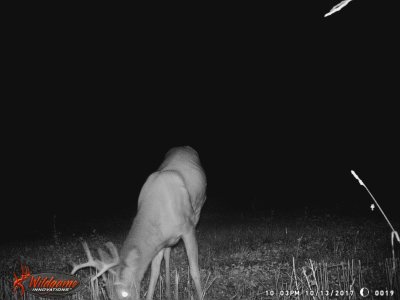You are using an out of date browser. It may not display this or other websites correctly.
You should upgrade or use an alternative browser.
You should upgrade or use an alternative browser.
Deadly Epizootic Hemorrhagic Disease in Deer - Public Information Session
- Thread starter anonymoose
- Start date
ya thats one sick deer alright...I remember walkin right up to a sick lookin moose...a sad sight alright..
I agree that climate change with warming temps is causing havoc... the quebec tundra caribou wipe out is just devastating to Canada...this season is the last caribou sport hunting and will end february 2018....it just sickens me the loss of canadas thriving caribou herd of the world
remember the Lyme Disease threat with our deer..carried by infected ticks and bugs
and now this blue tongue EHD threat ..carried by migit bugs
wheres are killer frost we use to have weeks ago to kill the bugs...I remember turning my furnace on at the latest Oct 1st...
Just to mention
I am selectively careful on where and what I harvest for game meat to eat...parasites exsist in some of our animals.. and thats a fact...I know first hand of a few horror stories of live parasites finding there way into the liver of 2 very sick people I personally know and the out come was invasive surgery to remove portions of there liver infected with living parasites.. and that was from eating raw game meat including caribou and black bear...i believe in getting my game properly processed and vacuumed sealed and frozen in my freezers for the minimum 3 months to kill the possibilty of exsisting parasites, and then I throughly cook the meat..no pink..and I discard the leftover cooked blood...sure i will cook up a tenderloin backstrap right away to celebrate...I also keep and eat the heart ..when field dressing your game you can inspect the internal organs and consider you have harvested a healthy animal...I have come across a couple of external & internal cysts that got my attention..and they were removed carefully...
I am sure some of you long time hunters know the threat with worms & bugs..
I agree that climate change with warming temps is causing havoc... the quebec tundra caribou wipe out is just devastating to Canada...this season is the last caribou sport hunting and will end february 2018....it just sickens me the loss of canadas thriving caribou herd of the world
remember the Lyme Disease threat with our deer..carried by infected ticks and bugs
and now this blue tongue EHD threat ..carried by migit bugs
wheres are killer frost we use to have weeks ago to kill the bugs...I remember turning my furnace on at the latest Oct 1st...
Just to mention
I am selectively careful on where and what I harvest for game meat to eat...parasites exsist in some of our animals.. and thats a fact...I know first hand of a few horror stories of live parasites finding there way into the liver of 2 very sick people I personally know and the out come was invasive surgery to remove portions of there liver infected with living parasites.. and that was from eating raw game meat including caribou and black bear...i believe in getting my game properly processed and vacuumed sealed and frozen in my freezers for the minimum 3 months to kill the possibilty of exsisting parasites, and then I throughly cook the meat..no pink..and I discard the leftover cooked blood...sure i will cook up a tenderloin backstrap right away to celebrate...I also keep and eat the heart ..when field dressing your game you can inspect the internal organs and consider you have harvested a healthy animal...I have come across a couple of external & internal cysts that got my attention..and they were removed carefully...
I am sure some of you long time hunters know the threat with worms & bugs..
Last edited:
anonymoose
Well-Known Member
@PlanB That sure is a skinny deer this time of year. I honestly don't know why this deer isn't putting on the pounds but I would expect neurological symptoms to be appearing before wasting to this degree if the deer had EHD. I'm not the specialist though, come hear it from the University of Guelph and MNRF in Dorchester!
its another wait and see whats up with our deer numbers after the controlled deer hunts...the harvest numbers are good in some areas and not so good in others.. some groups are tagged out by wednesday...and others are struggling to fill the rest of there tags by the end of the week..
if theres any dead deer found in the bush..I am sure will hear about it...
if theres any dead deer found in the bush..I am sure will hear about it...
Last edited:
anonymoose
Well-Known Member
Just a reminder that this event is tonight!
anonymoose
Well-Known Member
Here are a few take-home points from the night:
- EHD is a viral disease spread by biting midges. Only a couple of species of midges spread the virus. It requires the midges to spread it 90+% of the time (deer-to-deer transmission is rare). The midges are limited by climate and normally do not survive our winters. In recent years, the disease has been more and more prevalent further and further north. It is not clear whether this is due to climatic conditions or increased cold tolerance in the bugs. Bugs can travel large distances north on a gust of wind.
- In many cases infected deer die in 3-7 days (acute infection). They die in good body condition with severe hemorrhaging noticed internally. Multiple dead deer near/in water is common. Wide-scale losses of 25% of the population are common. Acute infection is the common form in herds that are not regularly exposed to the disease (chronic infection has different symptoms but I won't get into that).
- To date, only 2 confirmed deer in Ontario (bring on the hard frosts, baby)
- CWD is a prion, not a virus, and has very different vectors. Captive deer are a massive problem in North America and are the normal way this disease makes it way across the continent. Once it is in an area, massive-scale depopulation (cull every deer for miles) is the only hope of keeping it contained. The prion can remain active for years in soil.
The MNR presenter couldn't make it as she was quite sick so I delivered her presentation. I stole this from one of her slides, I hope she doesn't mind.

- EHD is a viral disease spread by biting midges. Only a couple of species of midges spread the virus. It requires the midges to spread it 90+% of the time (deer-to-deer transmission is rare). The midges are limited by climate and normally do not survive our winters. In recent years, the disease has been more and more prevalent further and further north. It is not clear whether this is due to climatic conditions or increased cold tolerance in the bugs. Bugs can travel large distances north on a gust of wind.
- In many cases infected deer die in 3-7 days (acute infection). They die in good body condition with severe hemorrhaging noticed internally. Multiple dead deer near/in water is common. Wide-scale losses of 25% of the population are common. Acute infection is the common form in herds that are not regularly exposed to the disease (chronic infection has different symptoms but I won't get into that).
- To date, only 2 confirmed deer in Ontario (bring on the hard frosts, baby)
- CWD is a prion, not a virus, and has very different vectors. Captive deer are a massive problem in North America and are the normal way this disease makes it way across the continent. Once it is in an area, massive-scale depopulation (cull every deer for miles) is the only hope of keeping it contained. The prion can remain active for years in soil.
The MNR presenter couldn't make it as she was quite sick so I delivered her presentation. I stole this from one of her slides, I hope she doesn't mind.

Thanks alot Ben for your time & effort posting that info!!!
I was told by other hunters and thought whitetail deer were resistant to CWD (brain worm). Years back brain worm wiped out the moose in and around rainy river & emo areas in WMU #10 and further north while Sunset country deer were flourishing..and it was my understanding brain worm was similiar to mad cow disease?
Ya lets hope mother natural is easy & kind on our local deer with this blue tongue EHD threat, I think some if any damage will be assessed after our controled deer hunts for this season...
I was told by other hunters and thought whitetail deer were resistant to CWD (brain worm). Years back brain worm wiped out the moose in and around rainy river & emo areas in WMU #10 and further north while Sunset country deer were flourishing..and it was my understanding brain worm was similiar to mad cow disease?
Ya lets hope mother natural is easy & kind on our local deer with this blue tongue EHD threat, I think some if any damage will be assessed after our controled deer hunts for this season...
Last edited:
anonymoose
Well-Known Member
Hey Mick,
CWD and Mad Cow (BSE) are both prions, which means they are a misshapen protein that can shape other proteins to replicate themselves. Being single molecules, prions are tiny and can last for years in the soil.
Brainworm is very different. It is a parasitic nematode, which is a tiny bug that infects the nervous system.
The two have symptoms in common as they both affect the nervous system. It is true that deer are much more resistant to brainworm than moose are. However, deer do not show resistance to CWD.
Ben
CWD and Mad Cow (BSE) are both prions, which means they are a misshapen protein that can shape other proteins to replicate themselves. Being single molecules, prions are tiny and can last for years in the soil.
Brainworm is very different. It is a parasitic nematode, which is a tiny bug that infects the nervous system.
The two have symptoms in common as they both affect the nervous system. It is true that deer are much more resistant to brainworm than moose are. However, deer do not show resistance to CWD.
Ben



